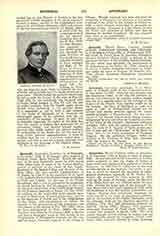

Antoniano, SILVIO, Cardinal, writer on education, b. December 31, 1540, in Rome; d. there August 16, 1603. He was educated at the University of Ferrara, which conferred on him the degree of Doctor of Laws (1556) and appointed him professor of classical literature. In 1563 Pius IV called him to the chair of belles-lettres in the Sapienza University, a position in which he enjoyed the friendship of distinguished churchmen, especially of St. Charles Borromeo. He resigned his chair, however, in 1566, took up the study of theology under the direction of St. Philip Neri, and was ordained priest, June 12, 1568. During the latter part of the sixteenth century Humanism made rapid progress in Italy under the leadership of men like Sadolet, Piccolomini, and Valiero. Sharing their enthusiasm, Antoniano devoted himself to the study of educational problems, and at the instance of St. Charles Borromeo, wrote his principal work on the Christian education of children. (Tre libri dell’ educazione cristiana de’ figliuoli, Verona, 1583.) Clement VIII appointed Antoniano Secretary of Papal Briefs (1593), and created him cardinal, March 3, 1599. His work passed through several editions in Italian and was translated into French by Guignard (Troyes, 1856; Paris, 1873), and into German by hunz (Freiburg, 1888). Its principal features are insight into the mind of the child, sympathy with its dangers and needs, and solicitude for its moral training. Valuable suggestions are also given on physical culture, on the education of all classes of the people and on the preparation of teachers for their work. The other writings of Antoniano, many of which have not been published, deal with literary, historical, and liturgical subjects. Their author was one of the compilers of the Roman Catechism and a member of the commission charged by Clement VIII with the revision of the Breviary.
E. A. PACE

